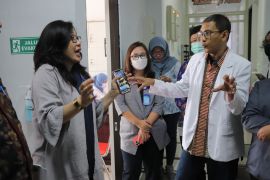NEW YORK and LONDON, Sept. 13 (ANTARA/PRNewswire-AsiaNet) --
Call for Nations to Support Early Diagnosis and Intervention
The World Alzheimer Report 2011, released today by Alzheimer's Disease International (ADI), shows that there are interventions that are effective in the early stages of Alzheimer's disease, some of which may be more effective when started earlier, and that there is a strong economic argument in favor of earlier diagnosis and timely intervention.
To prepare the report, titled "The Benefits of Early Diagnosis and Intervention," ADI commissioned a team of researchers led by Prof. Martin Prince at the Institute of Psychiatry, King's College London, to undertake the first-ever, comprehensive, systematic review of all of the evidence on early diagnosis and early intervention for dementia.
Currently, the great majority of people with dementia receive a diagnosis late in the course of the disease, if at all, resulting in a substantial "treatment gap." This greatly limits their access to valuable information, treatment, care, and support and compounds problems for all involved-patients, families, carers, communities and health systems.
"There is no single way to close the treatment gap worldwide," said Prof. Prince, the main author of the report. "What is clear is that every country needs a national dementia strategy that promotes early diagnosis and a continuum of care thereafter. Primary care services, specialist diagnostic and treatment centers and community-based services all have a part to play, but to differing degrees depending upon resources."
"Failure to diagnose Alzheimer's in a timely manner represents a tragic missed opportunity to improve the quality of life for millions of people," said Dr. Daisy Acosta, Chairman of ADI. "It only adds to an already massive global health, social, and fiscal challenge-one we hope to see in the spotlight at next week's United Nations Summit on Non-Communicable Diseases."
The new ADI report reveals the following:
- As many as three-quarters of the estimated 36 million people worldwide living with dementia have not been diagnosed and hence cannot benefit from treatment, information and care. In high-income countries, only 20-50% of dementia cases are recognized and documented in primary care. In low- and middle-income countries, this proportion could be as low as 10%.
- Failure to diagnose often results from the false belief that dementia is a normal part of aging, and that nothing can be done to help. On the contrary, the new report finds that interventions can make a difference, even in the early stages of the illness.
- Drugs and psychological interventions for people with early-stage dementia can improve cognition, independence, and quality of life. Support and counseling for caregivers can improve mood, reduce strain and delay institutionalization of people with dementia.
- Governments, concerned about the rising costs of long-term care linked to dementia, should "spend now to save later." Based on a review of economic analyses, the report estimates that earlier diagnosis could yield net savings of up to US$10,000 per patient in high-income countries.
"Over the past year, the research team has reviewed thousands of scientific studies detailing the impact of early diagnosis and treatment, and we have found evidence to suggest real benefits for patients and caregivers," said Marc Wortmann, Executive Director of ADI. "Earlier diagnosis can also transform the design and execution of clinical trials to test new treatments. But first we need to ensure that people have access to the effective interventions that are already proven and available, which means that health systems need to be prepared, trained and skilled to provide timely and accurate diagnoses, communicated sensitively, with appropriate support."
To that end, ADI recommends that every country have a national Alzheimer's/dementia strategy that promotes early diagnosis and intervention. More specifically, governments must:
- Promote basic competency among physicians and other health care professionals in early detection of dementia in primary care services.
- Where feasible, create networks of specialist diagnostic centers to confirm early-stage dementia diagnosis and formulate care management plans.
- In resource-poor settings, apply the World Health Organization's recently developed guidelines for diagnosis and initial management by non-specialist health workers.
- Publicize the availability of evidence-based interventions that are effective in improving cognitive function, treating depression, improving caregiver mood and delaying institutionalization.
- Increase investment in research-especially randomized control trials to test drugs earlier and over longer periods of time, and to test the efficacy of interventions with particular relevance to early-stage dementia.
About dementia and Alzheimer's disease
Dementia is a syndrome that can be caused by a number of progressive disorders that affect memory, thinking, behavior and the ability to perform everyday activities. Alzheimer's disease is the most common cause of dementia. http://www.alz.co.uk/about-dementia.
According to the World Alzheimer Report 2009, the number of people with dementia is forecast to nearly double every 20 years-from 36 million in 2010 to 115 million in 2050. According to the World Alzheimer Report 2010, the costs associated with dementia totaled US$604 billion, about 1% of global GDP.
September 2011 is the first-ever World Alzheimer's Month.
http://www.alz.org/wam/wam.asp.
About the World Alzheimer Report 2011
The 2011 World Alzheimer Report is available at http://www.alz.co.uk/worldreport2011, along with reports published in previous years.
Alzheimer's Disease International (ADI) is the international federation of 76 Alzheimer associations that support people with dementia and their families in their respective countries. Founded in 1984, ADI serves as a network for Alzheimer associations around the world to share and exchange information, resources and skills. Its vision is "a better quality of life for people with dementia and their families." ADI is based in London and is registered as a non-profit organization in the state of Illinois. For more information, visit http://www.alz.co.uk.
The Institute of Psychiatry is a school of King's College London and one of the world's largest post-graduate centers for research and teaching in psychiatry, psychology, and allied disciplines, including basic and clinical neurosciences. World-renowned for the quality of its research on psychiatry and psychology, the Institute is the most cited research center outside the United States, and the second most cited in the world as ranked by Thomson ISI Essential Science Indicators. Its world-class research-led learning experience attracts the top students from around the world. For more information, visit http://www.kcl.ac.uk/iop/index.aspx.
King's College London is part of King's Health Partners Academic Health Sciences Centre (AHSC), which delivers health care to patients and undertakes health-related science and research. For more information, visit http://www.kingshealthpartners.org.
SOURCE: Alzheimer's Disease International
Editor: PR Wire
Copyright © ANTARA 2011











